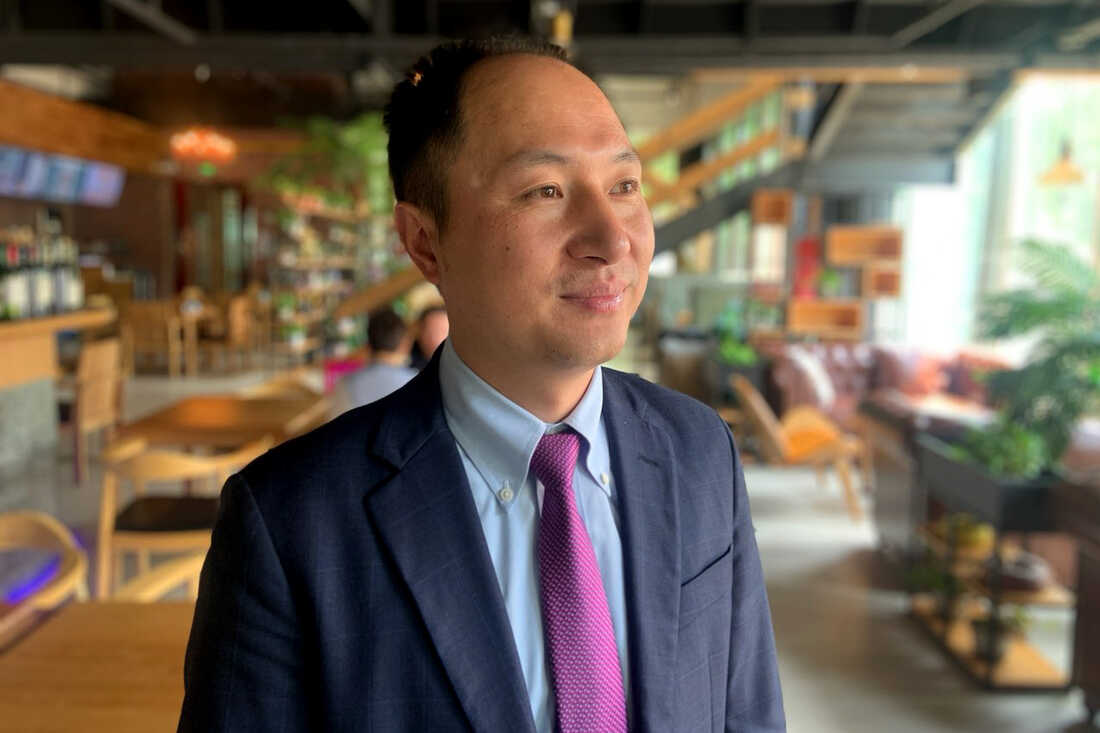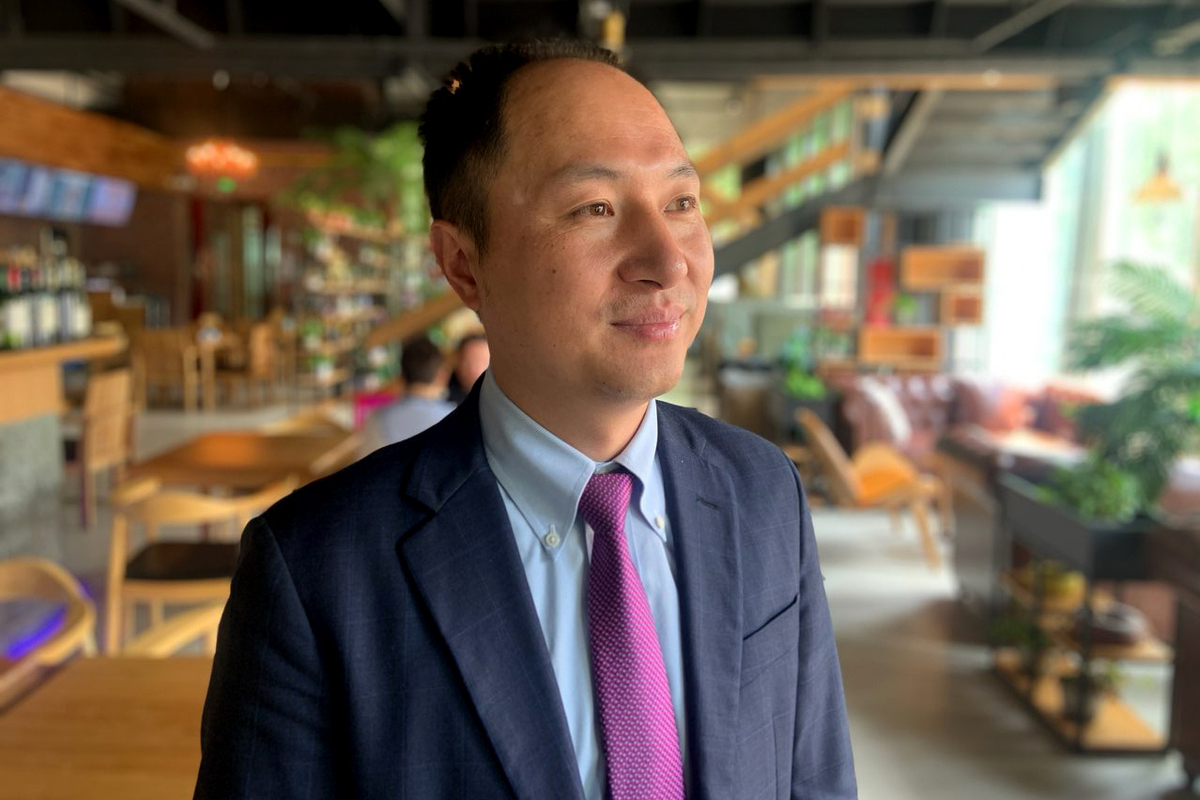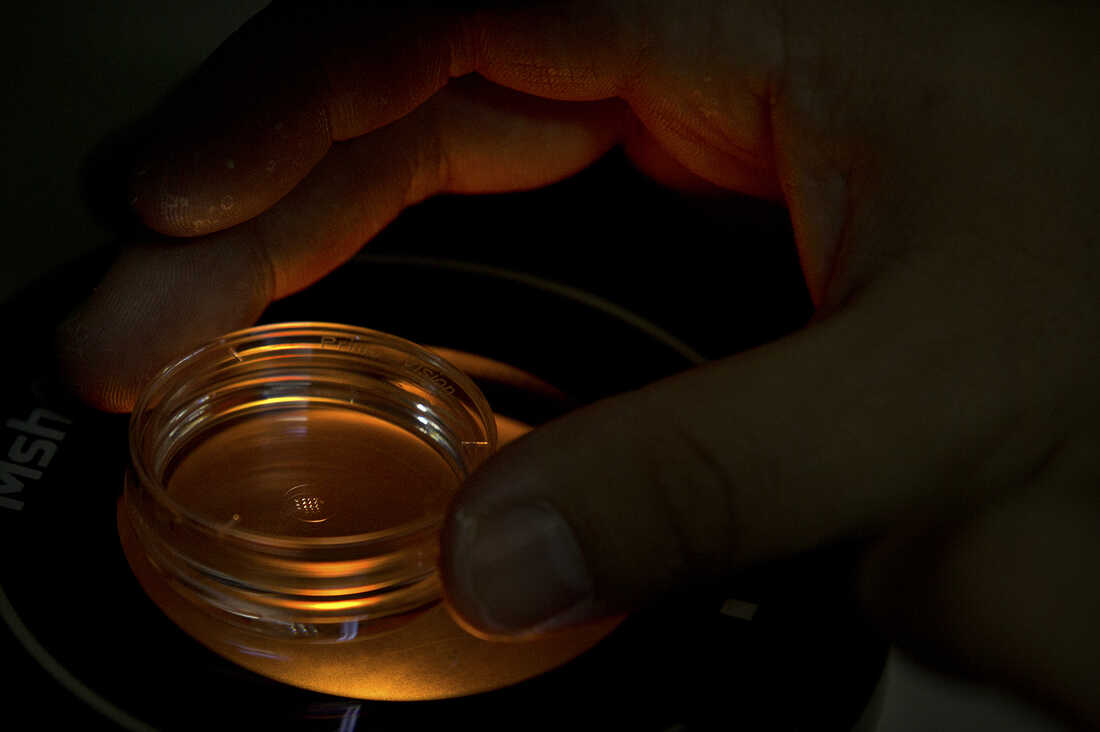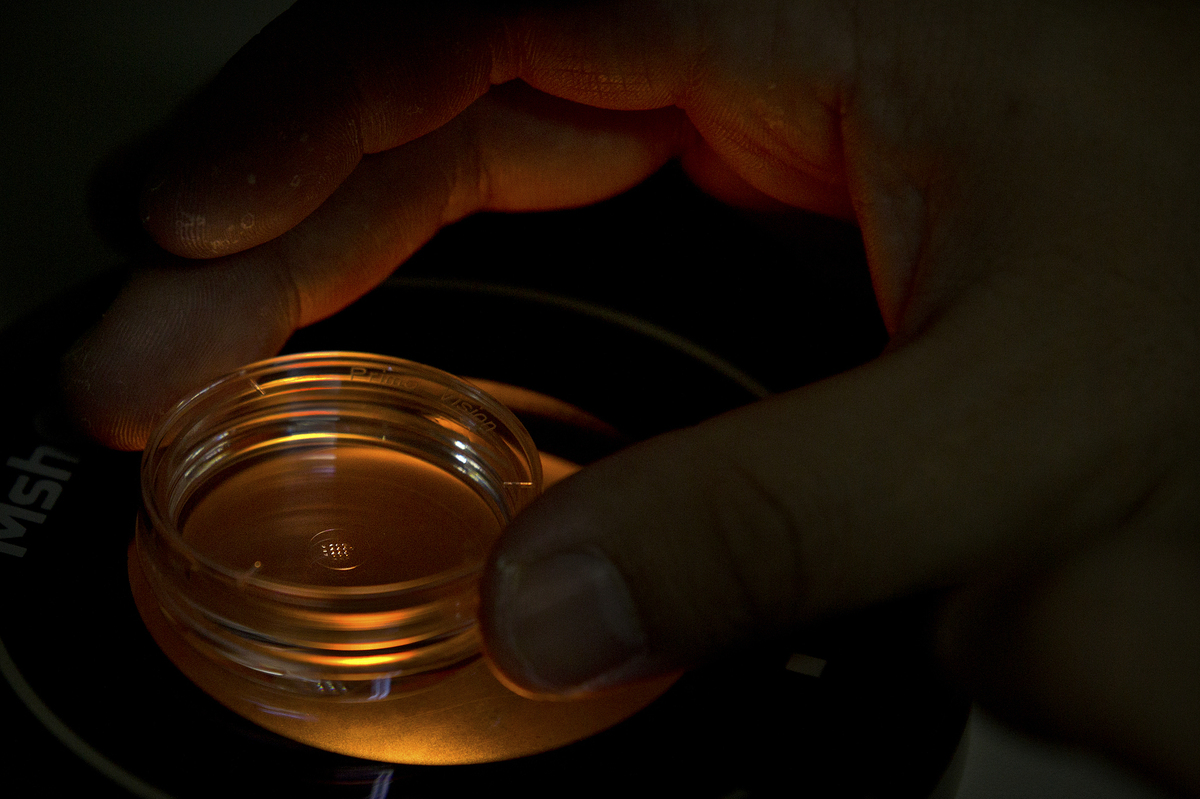
[ad_1]

He Jiankui introduced almost 5 years in the past that he had created the primary gene-edited infants.
Aowen Cao/NPR
conceal caption
toggle caption
Aowen Cao/NPR

He Jiankui introduced almost 5 years in the past that he had created the primary gene-edited infants.
Aowen Cao/NPR
BEIJING — In a principally empty coworking workplace on the outskirts of China’s capital, a scientist whose identify is etched in historical past is attempting to stage a comeback.
He Jiankui announced almost 5 years in the past that he had created the primary gene-edited infants, twin women named Lulu and Nana. The information despatched shockwaves around the globe. There had been accusations that the biophysicist had grossly violated medical ethics; some critics in contrast him to Dr. Frankenstein.
And he paid a worth. He was swiftly detained and a Chinese court docket later sentenced him to three years in jail for “illegal medical practices.”
About a 12 months in the past he acquired out, and says he took up golf. Then one thing surprising occurred.
“There [were] over 2,000 DMD patients, they are writing to me, text me, make phone call to me,” he says.
DMD, or Duchenne muscular dystrophy, is a genetic illness that causes muscle mass to waste away. There is not any remedy but. The sufferers, and their households, had heard about He from his child venture, he says.
“They want me to develop therapy for them,” he tells NPR in an interview.
The scientist’s transfer again into the lab comes at a time of lingering questions on his previous work — and is elevating new considerations amongst specialists about his motivations and people of the Chinese authorities, which jailed him and tightened laws on gene modifying within the wake of his experiment on embryos.
He’s conviction additionally got here with circumstances on future work. The authorities banned He from doing something associated to assisted human reproductive know-how, and imposed limits on his work regarding human genes. Many of the small print weren’t made public, nevertheless, and he didn’t reply when NPR emailed him for clarification.
Various Chinese authorities companies, together with the State Council, the National Health Commission, the Ministry of Science and Technology and Foreign Ministry, didn’t reply to NPR’s requests for remark.
“I did it too quickly”
On a late spring day, He invited NPR to turn into the primary journalists to go to his spartan workplace to speak about his new venture. And rapidly it grew to become clear: He was not all in favour of speaking concerning the previous.
He made a sequence of claims that NPR couldn’t substantiate.
Asked how he felt about what he had executed with the gene-edited infants, and whether or not he had drawn classes from it, He was imprecise.
“I did it too quickly. Yeah, I have just been thinking a lot in the past four years. Yeah, I did it too quickly,” he says.
Pressed on what which means, he wouldn’t say.
What He did was edit the genes in human embryos to attempt to make them resistant to HIV. He was broadly condemned as a result of the transfer sparked fears that he had opened the door additional to so-called designer infants — and nobody knew whether or not it was secure or the way it may have an effect on the infants’ well being.

An embryologist who was a part of the staff working with scientist He Jiankui adjusts a microplate containing embryos at a lab in Shenzhen in southern China’s Guandong province on Oct. 9, 2018.
Mark Schiefelbein/AP
conceal caption
toggle caption
Mark Schiefelbein/AP

An embryologist who was a part of the staff working with scientist He Jiankui adjusts a microplate containing embryos at a lab in Shenzhen in southern China’s Guandong province on Oct. 9, 2018.
Mark Schiefelbein/AP
So how are these kids, now almost 5 years previous?
“Well, what I can tell is they are living a normal, peaceful, nondisturbed life,” He says. Again, pressed for particulars — like the place they’re now and whether or not the gene modifying had any negative effects — he declined to remark. He says it is necessary for the world to learn about these points ultimately, however not now.
He additionally wouldn’t say a phrase about his jail expertise.
“I don’t want to talk about that anymore. … Just let it go,” he says. “I think no one can rewrite history and go back there and do [it] a better way or something. No. I just want to let it go so I can move on to my new project to cure patients.”
He’s utilizing CRISPR in his new lab
He says he has arrange a brand new lab — the Jiankui He Lab — the place he is utilizing the gene-editing tool CRISPR to provide you with a remedy for DMD. CRISPR is the know-how he used to edit genes in embryos, however he says his present work will not be centered on tweaking genes at that degree and the edits is not going to be handed from one era to the following.
“The idea is we have a single shot that contains materials that will do the gene editing. We inject it in the blood so it will spread to the whole body and reach the muscle, the muscle cells, get into the muscle cells, and precisely pick up the mutant gene and make it functional, correct it. And the patient is going to recover from the disease,” he says.
He says he is acquired some seed cash, together with from two American donors whom he is not going to identify. He has 5 employees working with him, and different “collaborators” exterior Beijing. He didn’t invite NPR to go to the lab, which is in Beijing.
“Currently we are at a stage [where] we design the experimental protocol and we are testing some of the formula. In a few months we are going to do the animal studies, using mice,” He says.
After mice — with approval from an moral evaluation board — the testing strikes on to canine, then monkeys. And he says he hopes scientific trials on people can begin in 2025.
That makes some folks nervous.
Experts say the science was unhealthy
“He very much wants to rehabilitate his reputation,” says Kiran Musunuru, a professor of drugs on the University of Pennsylvania who’s an knowledgeable in gene modifying and has adopted He’s case intently.
The professor says in modifying infants’ genes, not solely did He cross moral traces, the science itself was unhealthy.
And now the percentages are closely towards He coming near a remedy in such a short while on a budget, Musunuru provides, provided that a number of main drug firms have been engaged on it for years.
“There’s a reason why it’s so expensive to develop drugs and why it takes so long. Because you have to have a very, very, very high bar in terms of rigor. You got to make sure that this is safe, otherwise, you know, your patients are going to die when you give them a treatment that’s not well vetted,” he says.
A bunch of Chinese scientists and authorized specialists have called on the authorities to ban He from experiments involving folks. The group additionally stated in an announcement the authorities ought to examine He for alleged “re-violation of scientific integrity, ethical norms, laws and regulations.”
But the critics do not appear to faze him.
He studied within the United States
“I’m a scientist. I was trained in college in the United States to be scientist to solve science problem, to do something help [to] people. That’s something in my blood. It’s not easy to change,” he says.
He acquired his Ph.D. in physics at Rice University in 2010 and did postdoctoral analysis in a Stanford biophysics lab.
But observers marvel: Why would the Chinese authorities enable a convicted prison to get again into the gene-editing recreation?
Ben Hurlbut, an knowledgeable in bioethics at Arizona State University, considers it may must do with world competitors.
“What’s at stake is a kind of race for supremacy in biotechnology, and you know that kind of has a nationalist dimension to it,” he says.
He Jiankui will not be some rogue scientist who went off the rails, Hurlbut says. He had help and others in China knew what he was doing. The child gene-editing venture could not have performed effectively with the worldwide group, however what He did was an plain first. China was first.
But what He is doing is “a mixture of reckless and absurd,” says Hurlbut, who’s struck that He could be allowed to start the brand new analysis. “The nature of the sort of authorization and even support that he’s getting is interesting.”
The Chinese scientist says no authorities folks have talked to him concerning the work and he doesn’t get any monetary help from the authorities. “We do have contact with them [to] make sure that every step we do is follow[ing] the Chinese guidelines and laws,” he says.
He hopes for higher luck subsequent time
He is now centered on the trail forward. And he says belief in him shouldn’t be primarily based solely on earlier expertise.
“It’s based on what I’m doing at this moment. And show the data we have. Show the approval we have. Show the ethic guidelines we have. Everything. That will build the trust,” he says.
If you do issues proper, you need not fear about critics, he says. “And if it’s safe and effective and [you] get all the necessary governmental or institutional approval then we should be OK to move on.”
His present work, he says, relies on a transparent medical want. He maintains it follows worldwide tips and is being performed with the mandatory approvals, knowledgeable consent and transparency — claims which NPR couldn’t confirm.
He says he is already speaking with victims of different genetic illnesses, reminiscent of familial hypercholesterolemia and mucopolysaccharidoses, who need his assist.
Musunuru, the University of Pennsylvania professor, is extremely skeptical.
“You know, he’s not a physician. He has no medical training whatsoever. He has no training in clinical trials. He took it upon himself to run what he viewed as a clinical trial,” Musunuru says. “And, you know, to fast forward several years and what he’s doing now, I can see it playing out all over again.”
In the coworking workplace, on He’s desk is a copper statuette of Guan Gong — a Taoist god who represents loyalty to the king, and is alleged to maintain unhealthy fortune at bay. He lately traveled to the Wudang Mountains, in central China, the place he consulted a Taoist priest about his fortune.
“He told me after extremely bad luck comes good luck,” He says.
NPR producer Aowen Cao contributed reporting in Beijing.
[adinserter block=”4″]
[ad_2]
Source link



